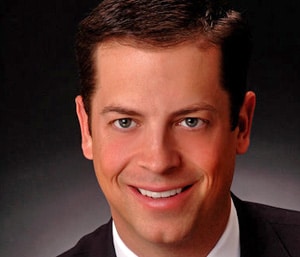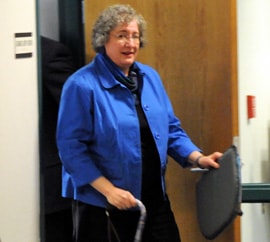
Ninth Judicial District Attorney Matt Chandler
Former Third Judicial District Judge Mike Murphy’s bribery trial remains on hold while the Court of Appeals considers whether to reinstate a misdemeanor charge. No trial date has been set.
The prosecutor in the bribery case against former Third Judicial District Judge Mike Murphy is fighting a judge’s order that a key witness turn over a list of every prescription drug she has taken during the past five years.
Ninth Judicial District Attorney Matt Chandler has asked the N.M. Supreme Court to overturn Judge Leslie C. Smith’s order requiring District Judge Lisa Schultz – a witness in the case – to turn over the information to him so he can decide, what, if any, of it is relevant.
In addition to arguing that Schultz’s medication history is irrelevant and that case law doesn’t support requiring its disclosure, Chandler argued in his June 4 filing that requiring the disclosure would “not only have a chilling effect upon witnesses who wish to disclose illegal activity, it would also open the floodgates for this type of harassment to occur.”
Read the filing here. The Supreme Court has not yet responded.
Murphy’s bribery trial remains on hold while the Court of Appeals considers whether to reinstate a misdemeanor charge. No trial date has been set.
In the meantime, lawyers have been arguing about Schultz’s prescription history, but Chandler states in his filing that it’s not relevant to the case – which is “not based in any form of fashion” on Schultz’s memory but is instead “based entirely on a tape recording” of a conversation Schultz had with Murphy.
In spite of that, Smith’s final order on the issue, dated June 4, states that he “simply wants to review whether the medications taken by the witness at the relevant time have side effects that include memory loss or forgetfulness.”

Judge Lisa Schultz, shown here leaving the grand jury room after testifying in the Murphy case last year. (Photo by Heath Haussamen)
In his appeal, Chandler states that Smith “is now acting as an expert in pharmaceuticals by independently reviewing what medications he believes can cause memory loss.”
Judge says Schultz can’t testify unless she complies
The issue first came up, Chandler wrote in his appeal, when Murphy’s attorney, Michael Stout, was interviewing Schultz on Sept. 19. Stout asked whether Schultz was on any medications, including antidepressants. Schultz refused to answer, citing the federal medical confidentiality law HIPPA.
Stout later raised the issue with Smith, saying it was appropriate to ask about medications because Schultz had surgery in 2008 and had to take medical leave. The crimes Murphy is alleged to have committed took place between September 2007 and December 2010.
Smith responded to Stout at that hearing with a hypothetical situation he acknowledged was “absurd,” saying if a witness was using heroin the jury would probably want to know that because, “when you’re an addict, you don’t remember anything. Everything is kind of fuzzy.”
Chandler objected. So did Schultz.
“I’m wondering why I’m being treated like a rape victim as opposed to, say, a witness of a train wreck,” the transcript of the hearing quotes Schultz as saying. “… I’m saying that this is a violation of my HIPPA rights to privacy… that, because I am disabled and because I had a foot surgery, now my medications are going to be disclosed?”
“If you don’t want to make it, don’t make it,” Smith responded about the list he is seeking. “It’s up to you. I’m ordering you to do it, but if you don’t want to do it, I can’t make you do it.”
Smith said Schultz only had to provide names of drugs, not dosages.
In the order he issued last week, Smith made clear that he will not allow Schultz to testify unless she complies. Smith’s order is on hold pending the outcome of Chandler’s appeal.
Schultz’s testimony is critical
Without Schultz’s testimony, Chandler would have a more difficult time proving his case against Murphy. Some of the charges Murphy faces stem from interactions with Schultz.
Murphy currently faces felony charges stemming from two cases. His May 2011 indictment on four felony charges is based on allegations that he solicited a bribe from potential judicial applicant Beverly Singleman, told Schultz to tell Singleman she needed to pay the bribe, and threatened to destroy Singleman’s reputation for telling others that he solicited a bribe from her.
Separate from that indictment, Murphy faces another felony charge for allegedly offering “several promises” to Schultz in December 2010 if she would agree to be the tie-breaking vote to make Douglas R. Driggers the chief district judge in Las Cruces.
Murphy has pleaded not guilty to all charges.
